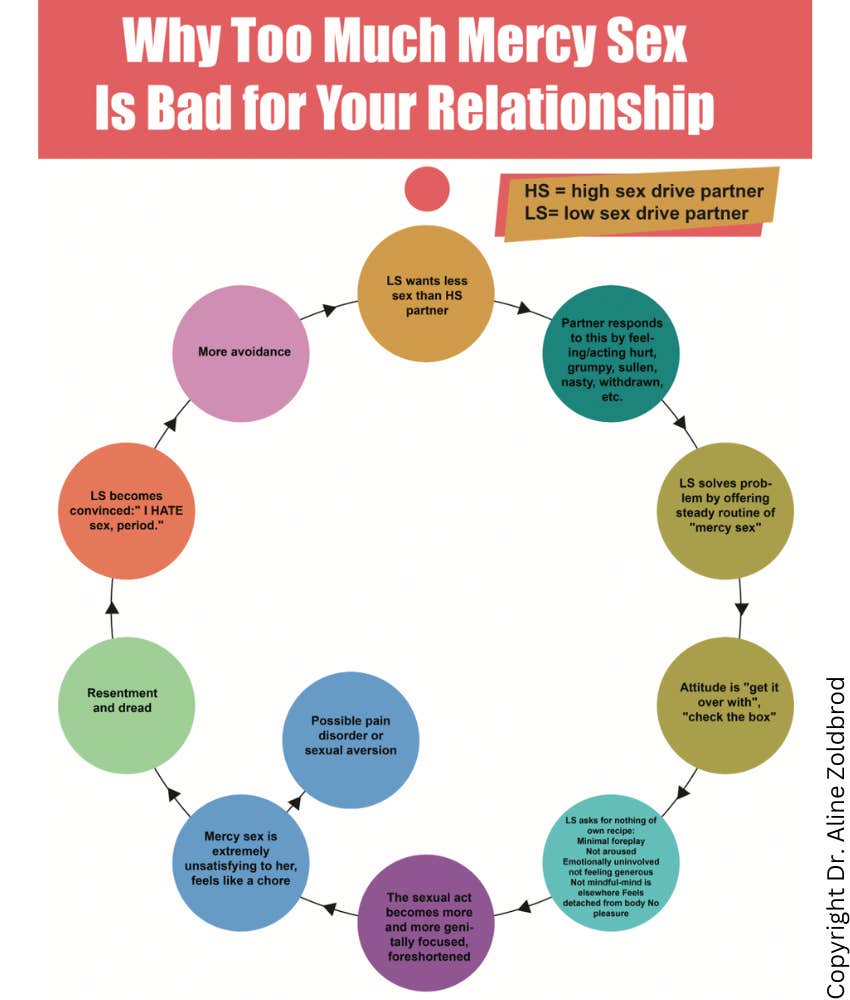The Honest Reason 'Shut Up Sex' Eventually Destroys Relationships
A sex therapist shares practical insights into why 'guilt sex' is bad for your bond.
 Prostock-studio | Shutterstock
Prostock-studio | Shutterstock Are you having “shut up” sex with your partner — in other words, sex that you are not actually into, but your partner wants? If so, I would not be surprised. Sexual desire discrepancy” — when one partner’s desire is higher or lower than his or her partner’s, is an unbelievably common, inevitable, and normal issue among couples, and it needs to be dealt with. But some solutions to this dynamic are much more healthy and helpful than others.
As a couple and sex therapist with many decades of experience, I can confidently state that having a standing routine of “shut up sex” (rather than including other solutions) can spell disaster over the long term. I know some well-meaning psychotherapists advise this plan to solve the vexing problem of couples who constantly fight over frequency, but I disagree.
I see the wreckage of this misguided strategy in many of the couples who come in to see me. And if constant shut-up sex is your main pattern of dealing with differences in sexual desire, I want to head it off at the pass and send you and your partner in a different direction.
Here's why "shut up sex" is risky for your relationship
1. Desire discrepancy occurs in 80 percent of couples
In and of itself, desire discrepancy does not necessarily change your satisfaction with your whole relationship, or with your sexual relationship.
2. Healthy alternatives to shut up sex
You two can creatively cope with differences in desire by acting right as the request/refusal event rears its head. By and large, communicating about the issue is step one. The person who is left longing feels seen and listened to if you talk it out. You can brainstorm what other kinds of activities you might do, in the moment, instead.
If things are good in the relationship and loving feelings predominate, if there is still pleasure in kissing and touching, but no wish for intercourse, in a straight couple, a woman could happily offer to do “outercourse” rather than intercourse. Outercourse, where the thrusting is between her thighs, allows for whole-body touch and eyeball-to-eyeball gaze. It can feel like a gift that does not entail the same level of physical intrusion as intercourse.
Negotiate about whether there are still other kinds of touch that might be pleasurable, right now, and about solo or couple masturbation. Discuss what each of you might like in the way of partnered activities that create other kinds of closeness and feelings of being cherished, accepted, and sexually desired (even if not on the specific day or evening requested). Do them now or make a plan to do them later. Be compassionate to each other, because having these conversations and voicing these longings is a brave undertaking. It is difficult for many people to ask for what they need.
3. Gender issues
Shut-up sex can occur in any relationship. But because of gender socialization, anatomy, and biology, I see it most often in heterosexual couples, and most often when a male is the pursuer. Testosterone is the hormone of desire, and in average adult males, testosterone levels are seven to eight times as high as in adult females. Talk about inevitability!
4. The most common dangers of steady shut-up sex
What are the dangers of constant shut-up sex as a solution? They are very similar to what I described here in an article on the dangers of what I usually call “mercy sex” back in June of 2015.
Most shut-up sex is quick, foreplay-limited, and goal and performance-oriented. It’s check-the-box sex. Often, there is penetration without a truly accepting orifice, artificial lubricants instead of arousal. Without arousal, there is no pleasure for the person who is acquiescing. It’s a job.
Partners can become resentful and grow to think they hate sex. Women who have intercourse when they are not aroused can develop pain disorders. Partners who are harangued into providing manual release or oral sex, too, can feel coerced.
 Dr. Aline Zoldbrod | SexSmart.com
Dr. Aline Zoldbrod | SexSmart.com
5. Coercion or consent?
I have worked with many women who provided gobs of shut-up sex and then, talking to me, began to understand that they had felt coerced for years and years. In the process of silencing themselves, they did not acknowledge their feelings. So obviously, they could not share them.
They never confronted their partner about feeling coerced. Or, in their unease and humiliation of labeling it coercion, in their shame of acknowledging what they had allowed to be done to them in the relationship, or in their fear of hurting their partner’s feelings, or their terror of eliciting their partner’s anger, they created a false appearance no harm was being done. The shut-up sex looked to their partner like a passive acquiescence to an expected relationship duty. Part of the deal. No problem. Their partner may have had no idea.
The feeling of coercion can exist without any physical threat. Having a partner who is angry or moody for days after being refused a sexual release is a form of coercion. So the provider of shut-up sex can begin to feel contempt for themselves or contempt for their partner.
Don’t fool yourself. Constant shut-up sex as a pattern will cheat each of you. It is counterproductive to a healthy erotic bond, to experimentation, to personal growth, and for each of you, to increase sexual self-esteem.
6. Cheating yourselves out of personal growth, more integration as a person
Women may need to learn to like sex. That’s right, learn to like sex. The hormones of lust propel all of us to experience a huge surge in desire and easy arousal at the beginning of relationships. (If you want to understand this more, read Dr. Helen Fisher. ) There are multiple reasons why women can reach adulthood without discovering the joys of sexual pleasure for themselves.
I discuss the family-of-origin pieces of this arrested sexual development in detail in my book SexSmart: How Your Childhood Shaped Your Sexual Life and What to Do About It.
These early hormones of desire can mask the fact that a woman never actually learned to enjoy sexual sensations for herself. Elsewhere, I have talked about what I call the difference between women’s inherent and reflective desires. A woman with inherent desire has discovered, often in adolescence, her pleasure recipe. She has a firm sense of being a sexual being in her own identity, separate from whether she is desired by another person.
 PeopleImages.com - Yuri A via Shutterstock
PeopleImages.com - Yuri A via Shutterstock
I propose that in a woman with reflective desire, part of what may feel like a woman’s own desire at the beginning of a relationship is the “reflective sexual desire”, which is based on enjoying the seduction, the conquest, and the power. Her "desire" reflects the desire of her partner. Thus, once the partner is seduced and securely obtained, once the hormones of romance and lust subside in her, the woman who has only reflective desire loses interest in having sexual pleasure.
Some women who rely mainly on “shut up sex” may never have learned the joys of sexual pleasure. If this describes you, and you depend on only “shut up sex”, you are eliminating the possibility of developing yourself as a happy and fully sexual human being.
For the person who is pursuing and hopelessly, desperately settling for lots of “shut up sex, ” the extreme need to have frequent sex may mask a deeper, general wish to be reassured and validated as a loved, precious human being. Often, working on healing that lack of a felt sense of self-love and self-esteem can create a new you. At that point, you will understand yourself better, can soothe yourself, and you will be able to feel more content with less frequent, authentically desired sex.
In the overall calculus of life, then, choosing shut-up sex as the main solution to the inevitable desire discrepancy you face as a couple is a bad deal. Do me and yourselves a favor and invest in exploring the alternatives offered you here.
Psychologist Aline Zoldbrod Ph.D. is a psychologist and sex therapist near Boston, hosts her own blog on the subject, and is an award-winning author of ‘SexSmart’, a book that explains how your family of origin has shaped your sexuality.
